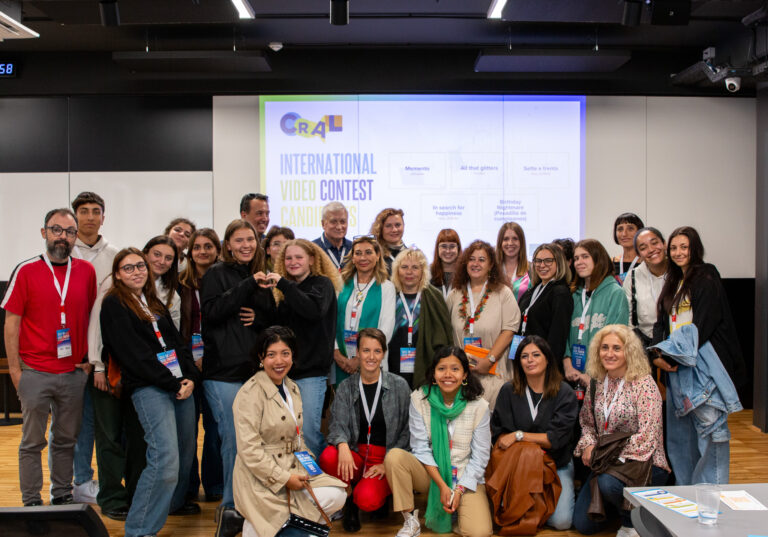Thanks to all the hard work put in by all of our participants, the CrAL methodology continues to show promise for the future of critical thinking and media literacy. During the CrAL international workshop that took place on the 25th of September 2023, the results from the Impact Assessment Conclusions were presented, providing insight into the project’s achievements as well as policy recommendations for future implementation. These results vary from country to country and are a reflection of where we currently are with the project.
Lithuania
A total of 13 students participated and worked together with their colleagues on the topics of:
- Exile
- Parent-child relationship
- Emotional dependency.
In terms of skill improvement, 92% of the students responded that they have become active creators of solutions to social challenges. Moreover, 100% think that it could be applied with young people from different countries. Finally, 54% would recommend other students to participate in CrAL’s labs to learn critical thinking and media literacy, while 46% would not.
After the implementations, 7 teachers were asked about the reinforcement of their ability to teach media literacy and critical thinking with the implementation of CrAL Lab workshop. From this, 43% of the teachers answered that they ‘totally agree’, 43% ‘agree’ and 14% ‘I don’t know’. In terms of the usefulness of the lessons, the results are the same: 43% of the teachers answered that they ‘totally agree’, 43% ‘agree’ and 14% ‘I don’t know’. They have implemented a total of 46 workshops and worked on a variety of topics including how to film and create a documentary, the script, the history of cinema, audio and video syntax, character, screenwriting and editing.
Italy
A total of 44 students participated and worked together with their colleagues on the topics of:
- Rescue of Jews in Lake Trasimeno during World War II
- Environment and sustainability
- Storytelling, travel and immigration
- Photography and research
- Empress Theodora
- Art, music, painting and poetry
- Culture and cooperation
Regarding skill improvement, 100% of the students responded that they have become active creators of solutions to social challenges, while 38% would strongly recommend other students to participate in CrAL’s labs to learn critical thinking and media literacy.
After the implementations, 7 teachers were asked about the reinforcement of their ability to teach media literacy and critical thinking with the implementation of CrAL’s Lab workshop. From this, 44% of the teachers answered that they ‘totally agree’, 33% ‘agree’ and 22% ‘disagree’. Also, they have been asked about the usefulness of the lessons in a blended learning course. 67% of the teachers answered that they ‘totally agree’ and 33% ‘agree’. They have implemented a total of 41 workshops and worked with different topics including conscious use of social networks, sustainability objectives of the 2030 Agenda, travel, self-knowledge and otherness, awareness of the development of empathic thinking, the development of cities and their transformations, forms of communication and the language of the media, Europe and film techniques.
Croatia
A total of 29 students participated and worked together with their colleagues on the topics of:
- Social stereotypes
- Drug use in youth
- Depression, loneliness and isolation
- Feminism
In terms of skill improvement, 80% of the students responded that they have become active creators of solutions to social challenges, while 100% think that it could be applied with young people from different countries. 52% would strongly recommend other students to participate in CrAL’s labs to learn critical thinking and media literacy.
Following the implementations, 7 teachers were asked about the reinforcement of their ability to teach media literacy and critical thinking with the implementation of CrAL Lab workshop. From this, 29% of the teachers answered that they ‘totally agree’, 57% ‘agree’ and 14% ‘disagree’. They were also asked about the usefulness of the lessons in a blended learning course, of which the results are the same. They have carried out a total of 72 workshops and have worked with different topics including creating scenarios, stereotypes and gender inequality, active citizenship, drug use among young people.
Positive aspects
These results show that CrAL has improved both students technical skills and overall media literacy competences. In addition, students have improved their collaborative skills and their ability to work in teams. The relationship with the teachers has also improved. In Italy, for example, students have pointed out how Cral has allowed them to see their teachers in a new light, showing that they can be partners in learning rather than judges that assess their performance. The participants highly appreciate the methodology, stating that this particular approach has helped them. Finally, both students and teachers alike have appreciated that CrAL is focused more on the process of learning in itself rather than on the output, making the learning process more enjoyable.
Opportunities for improvement
Most teachers recognize that while video can be an excellent tool to reflect upon social problems, students tend to avoid these topics to center their attention to problems more relevant to them. Accordingly, it would be interesting to focus specifically on social or political issues to invite students to analyze them and observe them from distinct points of view. In this sense, a sort of localization of the project may be helpful.
When it comes to implementing CrAL, most teachers reveal that they lack time to develop these kinds of activities. As a result, its implementation is left to the good will of teachers that make the effort to stay longer at school without receiving any additional economical compensation. Students and teachers both agree that projects like CrAL should be included in the official curriculum as a transversal project or inserted within a specific subject to have enough time to work on the activities.
These outcomes are tentative since the findings from Greece and Spain are still in progress. As of now, both teachers and students are satisfied with their learning outcomes from CrAL and would like to see it put into action in the future.

